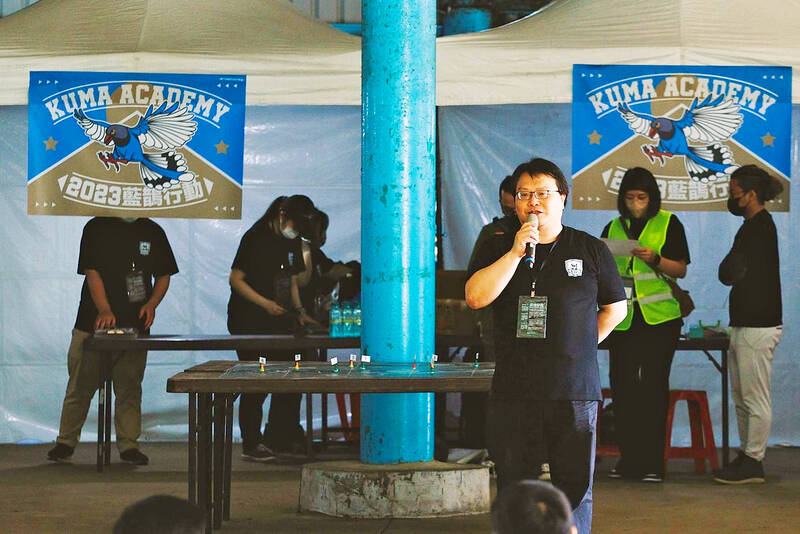The National Security Bureau should investigate the source of funding for influencers and key opinion leaders who post pro-China content that denigrates Taiwan, a researcher said on Monday last week.
A number of Taiwan-based content producers disseminate pro-China content and receive a significant income through donations, ad revenue and other sources, Southern Taiwan University of Science and Technology Institute of Financial and Economic Law director Lo Cheng-chung (羅承宗) said.
“Taiwan protects freedom of speech, regardless of whether you’re pro-unification or pro-independence. However, if that speech is in exchange for money, that’s recognized under law as commercial speech,” he said.

Photo courtesy of Kuma Academy
“If Taiwanese influencers are receiving money from the Chinese Communist Party (CCP) for political advertisement, the Taiwanese government is able to exercise control over that,” he said.
However, the tricky part would be for the government to prove that money was received for the purpose of disseminating Chinese propaganda, he added.
Security officials would have to trace unexplained increases in assets, and expenditures that are inconsistent with the content producer’s income, he said.
“What percentage of the donations of the top 10 content producers in Taiwan comes from China or some other country? If the majority is coming from outside Taiwan, then obviously that’s something that should be investigated,” he said.
China’s propaganda campaign is evolving and rarely involves use of traditional media, instead focusing on social media platforms such as TikTok and YouTube, he said, adding that videos posted there often contain disinformation.
“The CCP pays key opinion leaders to make dozens of videos on everyday topics, and then has them periodically slip in controversial content aimed at spreading its influence,” he said.
“They also don’t just use politics-focused key opinion leaders, they inject pro-China content into all types of channels including everything from celebrity gossip to travel and food-related channels,” he said.
Kuma Academy chief executive officer Ho Cheng-hui (何澄輝) said he also noticed increased CCP activity in social media, as well as evidence that the CCP is training Taiwanese content creators, and is using marketing companies to help it increase the number of Taiwanese followers these creators have.
“There have been reports that the CCP co-opts Taiwanese marketing companies to help it promote pro-China videos,” he said.
“It also uses social media to spread disinformation on key issues like elections in Taiwan, or Taiwan’s pandemic measures,” he said, adding that the government should ban TikTok and other Chinese platforms used by the CCP to spread propaganda.

Taiwan is stepping up plans to create self-sufficient supply chains for combat drones and increase foreign orders from the US to counter China’s numerical superiority, a defense official said on Saturday. Commenting on condition of anonymity, the official said the nation’s armed forces are in agreement with US Admiral Samuel Paparo’s assessment that Taiwan’s military must be prepared to turn the nation’s waters into a “hellscape” for the Chinese People’s Liberation Army (PLA). Paparo, the commander of the US Indo-Pacific Command, reiterated the concept during a Congressional hearing in Washington on Wednesday. He first coined the term in a security conference last

Prosecutors today declined to say who was questioned regarding alleged forgery on petitions to recall Democratic Progressive Party (DPP) legislators, after Chinese-language media earlier reported that members of the Chinese Nationalist Party (KMT) Youth League were brought in for questioning. The Ministry of Justice Investigation Bureau confirmed that two people had been questioned, but did not disclose any further information about the ongoing investigation. KMT Youth League members Lee Hsiao-liang (李孝亮) and Liu Szu-yin (劉思吟) — who are leading the effort to recall DPP caucus chief executive Rosalia Wu (吳思瑤) and Legislator Wu Pei-yi (吳沛憶) — both posted on Facebook saying: “I

The Ministry of Economic Affairs has fined Taobao NT$1.2 million (US$36,912) for advertisements that exceed its approved business scope, requiring the Chinese e-commerce platform to make corrections in the first half of this year or its license may be revoked. Lawmakers have called for stricter enforcement of Chinese e-commerce platforms and measures to prevent China from laundering its goods through Taiwan in response to US President Donald Trump’s heavy tariffs on China. The Legislative Yuan’s Finance Committee met today to discuss policies to prevent China from dumping goods in Taiwan, inviting government agencies to report. Democratic Progressive Party Legislator Kuo Kuo-wen (郭國文) said

The Ministry of Economic Affairs has fined Taobao NT$1.2 million (US$36,900) for advertisements that exceeded its approved business scope and ordered the Chinese e-commerce platform to make corrections in the first half of this year or its license would be revoked. Lawmakers have called for stricter supervision of Chinese e-commerce platforms and more stringent measures to prevent China from laundering its goods through Taiwan as US President Donald Trump’s administration cracks down on origin laundering. The legislature’s Finance Committee yesterday met to discuss policies to prevent China from dumping goods in Taiwan, inviting government agencies to report on the matter. Democratic Progressive Party